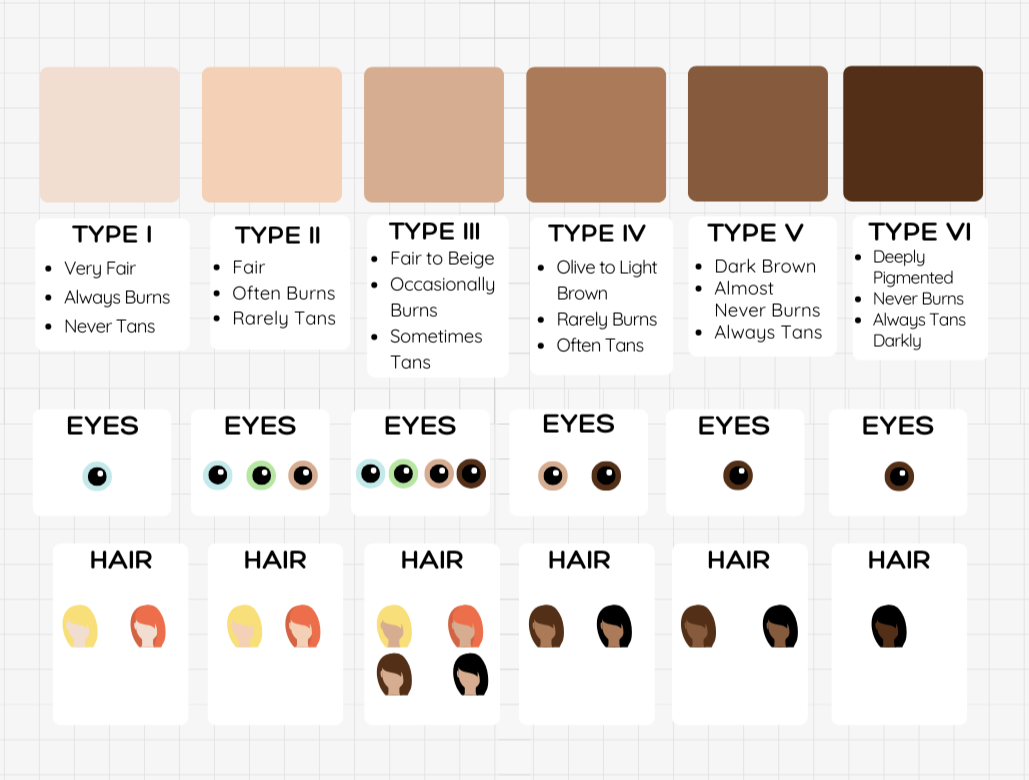

The Best SPF for Your Skin Tone:
Sabina JasinskiWhy SPF Matters for Every Skin Type
Sun protection is one of the most crucial steps in any skincare routine. Whether you have fair or deep skin, wearing sunscreen daily helps prevent premature aging, sunburn, and the risk of skin cancer. But with so many options available, how do you determine which SPF level is right for you? The answer depends on multiple factors, including your skin type, sun sensitivity, and lifestyle.
The Fitzpatrick Scale is a useful tool that dermatologists and skincare professionals use to classify skin based on how it reacts to the sun. Understanding your Fitzpatrick skin type can help you choose the best SPF and tailor your sun protection routine to your specific needs.
the Fitzpatrick Scale
Understanding the Scale and SPF Recommendations
The Fitzpatrick Scale categorizes skin into six types, ranging from Very Fair (Type I) to Deeply Pigmented (Type VI). While hair and eye color vary within these types—Types VI-IV can still have light eyes, and Types I-II can still have dark hair and eyes—each type has a different response to sun exposure, which determines how much protection is necessary to prevent sun damage. Type VI has the lowest risk of skin cancer, and Type I has the highest, but all skin types should protect their skin from the sun with regular sunscreen use and sun-safe behaviors. Below is a breakdown of each skin type and the recommended SPF for optimal protection.
Description: Pale skin, often with red or blonde hair and blue or green eyes.
Sun Reaction: Always burns, never tans.
SPF Recommendation: SPF 50+ (broad-spectrum) with UVA/UVB protection. Reapply every 2 hours and wear protective clothing.
Common Concerns: High risk of sunburn, increased skin cancer risk, premature aging.
Recommended Products: Mineral-based sunscreens with zinc oxide, fragrance-free formulations for sensitive skin.
Description: Fair skin with light eyes and hair.
Sun Reaction: Usually burns, tans minimally.
SPF Recommendation: SPF 50+ daily, with reapplication every 2 hours when exposed to the sun.
Common Concerns: Sun damage, fine lines, pigmentation.
Recommended Products: Lightweight, hydrating sunscreens with antioxidants like vitamin E or niacinamide.
Description: Beige to light brown skin with darker hair and eyes.
Sun Reaction: Sometimes burns, tans gradually.
SPF Recommendation: SPF 30–50, depending on sun exposure levels. Daily use is essential to prevent premature aging and pigmentation.
Common Concerns: Uneven skin tone, post-inflammatory hyperpigmentation (PIH).
Recommended Products: Gel-based sunscreens that are invisible and absorbes quickly.
Description: Light to medium brown skin.
Sun Reaction: Rarely burns, tans easily.
SPF Recommendation: SPF 30–50 for daily wear, depending on sun exposure.
Common Concerns: Hyperpigmentation, melasma, dullness.
Recommended Products: Sunscreens with iron oxides to protect against hyperpigmentation and blue light.
Description: Dark brown skin with darker eyes and hair.
Sun Reaction: Very rarely burns, tans easily.
SPF Recommendation: SPF 30–50, with emphasis on broad-spectrum protection.
Common Concerns: Hyperpigmentation, dark spots, uneven tone.
Recommended Products: Gel-based sunscreens to prevent white cast.
Description: Deep brown to black skin.
Sun Reaction: Rarely burns, always tans.
SPF Recommendation: SPF 30 minimum for daily use, ensuring broad-spectrum protection to prevent hyperpigmentation.
Common Concerns: PIH, dark spots, dehydration.
Recommended Products: Hydrating sunscreens with shea butter or glycerin, non-greasy formulations for daily use.
Choosing the Right Sunscreen for Your Skin Type
- For sensitive skin: Opt for mineral sunscreens with zinc oxide or titanium dioxide to avoid irritation.
- For oily/acne-prone skin: Look for lightweight, oil-free, or gel-based sunscreens with a matte finish.
- For dry skin: Choose a moisturizing sunscreen with hydrating ingredients like hyaluronic acid or ceramides.
- For hyperpigmentation concerns: Consider sunscreens with niacinamide, vitamin C, or iron oxides to help even out skin tone.
Key Takeaways
- Sunscreen is essential for all skin types, regardless of tone or sun tolerance.
- The Fitzpatrick Scale helps determine how your skin reacts to sun exposure and guides SPF selection.
- Always use broad-spectrum sunscreen to protect against both UVA and UVB rays.
- Reapply sunscreen every 2 hours, especially if outdoors, swimming, or sweating.
By understanding your skin type and its needs, you can make informed choices about sun protection and maintain long-term skin health.











